Coal Giant Southern Company Claims It Will No Longer 'Engage In Influencing the Science' of Climate Change
The massive coal-powered utility Southern Company, recently revealed as a top funder of Harvard-Smithsonian climate denier Willie Soon, claims it is getting out of the business of climate denial. Southern Company’s contract with the Harvard-Smithsonian Center for Astrophysics included conditions giving it oversight over Soon’s research and a pledge to keep its funding secret.
The Southern Alliance for Clean Energy reports:We have been given assurance that Southern Company takes responsibility for the funding but stated that upper management did not have direct knowledge of this activity. We also appreciate the perspective that the funding contract with Dr. Soon was of a recurring nature and that Southern has stated that they will not renew funding contracts in this line of research. Southern further acknowledges that going forward, it is does not want to “engage in influencing the science.”
Although Southern Company may cease directly financing the very few legitimate scientists who promote disinformation about man-made cliamte change, it’s doubtful the company will stop supporting the massive climate-denial infrastructure that is nearly indistinguishable from the American right. In the 2014 cycle, Southern Company made hundreds of thousands of dollars in contributions to climate-science-denying Republicans. The utility giant has spent over $130 million since 2004 lobbying Congress, with a focus on blocking the regulation of coal pollution.
In 2014, Southern Company ran a “sponsored content” series on The New Republic’s website, entitled “Powering the Future, Honoring the Past,” which celebrated the utility’s “secure energy mix” of “the full portfolio of energy resources: nuclear, twenty-first-century coal, natural gas, renewables, and energy efficiency.”
“Corporate responsibility is part of our DNA,” one of the Southern Company “sponsored content” public-relations pieces claimed.
In a separate article, the New Republic’s Rebecca Leber criticized the Southern Company-Willie Soon relationship.
American Meteorological Society Objects to Congressional Investigation of Its Anti-Science Members
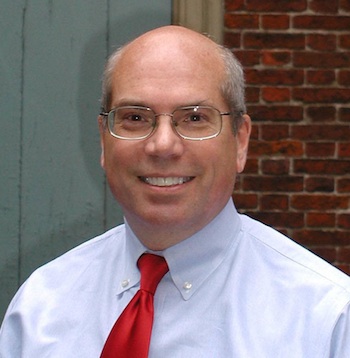
AMS Executive Director Keith Seitter
The investigation was launched by Rep. Raul Grijalva (D-Ariz.) following the revelations that the research of Dr. Willie Soon of the Harvard-Smithsonian Astrophysical Laboratory was secretly financed by the fossil-fuel industry, including Koch Industries, Exxon Mobil, and Southern Company. Soon testified before Congress in 2003 questioning the scientific consensus on fossil-fueled global warming.
Grijalva sent letters to the universities of seven other academics who have been Republican witnesses challenging the climate-science consensus, asking for testimony-related financial disclosure. Seitter responded by condemning the investigation.
"Publicly singling out specific researchers based on perspectives they have expressed and implying a failure to appropriately disclose funding sources — and thereby questioning their scientific integrity — sends a chilling message to all academic researchers," Seitter wrote in the AMS response. "Further, requesting copies of the researcher’s communications related to external funding opportunities or the preparation of testimony impinges on the free pursuit of ideas that is central to the concept of academic freedom."
Not mentioned by Seitter is that six of the seven targets of the Grijalva investigation are AMS members.
Judith Curry was elected a Fellow of AMS in 1995 and a councillor of AMS in 1997. John Christy received a Special Award from AMS in 1996, and was elected a Fellow in 2002. David Legates has been the faculty advisor to the Student Chapter of AMS and is an AMS certified consulting meteorologist. Richard Lindzen has received AMS's Meisinger and Charney Awards and was a member of the AMS Council. Robert Balling is a member and frequent presenter at AMS conferences. Roger Pielke Jr is an AMS member.
Pepperdine and American Enterprise Institute historian Steven Hayward is the only investigative target not in the American Meteorological Society.
These AMS members are notable for their public denunciation of the scientific community and specific scientists, including other members of AMS.
Below are some examples.
"The problem is that Obama is listening to scientists that are either playing politics with their expertise, or responding to a political mandate from the administration (probably a combination of both). Not just administrators in govt labs (e.g. [Gavin] Schmidt, [Tom] Karl), but think of the scientist networks of John Holdren and John Podesta: to me the scariest one one is [Michael] Mann to [Joseph] Romm to Podesta." - Judith Curry, 1/21/15
"When you're an alarmist, being wrong, lying, cheating, misleading the public and killing jobs simply do not count against you — even when the allegedly human-caused global warming stopped in 1996." - David Legates, 10/16/13
"[The hacked University of East Anglia email correspondence] is clear proof of what we have suspected: That these thugs have strong-armed and subverted the peer review process by demanding they be reviewers of papers critical of their work, removing editors who are not predisposed to their views, and even threatening to boycott journals that publish papers with which they disagree.” - David Legates, 1/18/10
"Because this issue has policy implications that may potentially raise the price of energy significantly (and thus essentially the price of everything else), the U.S. Congress should not rely exclusively on the U.N. assessments because the process by which they were written includes biased, false, and/or misleading information about one of the most murky of sciences – climate." - John Christy, 3/31/11
"[The Draft National Assessment on Climate Change] is much closer to pseudoscience than it is to science. . . . History tells us that when scientists willingly endorse sweeping governmental agendas fueled by dodgy science, bad things soon happen." - Robert Balling, 4/15/13
"It is quite amazing to see the contortions the IPCC has to go through in order to keep the international climate agenda going." - Richard Lindzen, 9/28/13
"Current global warming alarm hardly represents a plausible proposition. Twenty years of repetition and escalation of claims does not make it more plausible. Quite the contrary, the failure to improve the case over 20 years makes the case even less plausible as does the evidence from climategate and other instances of overt cheating." - Richard Lindzen, Congressional testimony, 11/17/10
Hill Heat has previously compiled a list of dozens of attacks made by Roger Pielke Jr, a political scientist, against climate scientists.
Roger Pielke Sr, Pielke Jr's father and another climate scientist who has testified before Congress rejecting the climate science consensus, was elected a Fellow of AMS in 1982. Pielke Sr was a member of the AMS Committee for Statements on Weather Modification. AMS's official statement on climate change was issued in August 2012, after significant delay. Pielke Sr was a likely source of such delay, as he strongly advocated for changes to weaken the statement. Pielke Sr has accused fellow AMS members including Tom Karl, Ben Santer, Tom Peterson, Tom Wigley, and Peter Thorne of "inappropriate" behavior, "collusion," and "conflicts of interest" to suppress dissenting views [his].
This is not the first time the executive director of the AMS has criticized efforts to hold climate deniers publicly accountable.
Seitter previously criticized the science-activist organization Forecast the Facts for "apply[ing] public pressure" on "broadcast meteorologists who are identified as 'deniers' based on views they have expressed with respect to climate change."
Dozens of television weather reporters who have attacked climate science and scientists are AMS members. At least twenty television weathermen who publicly reject basic climate science are AMS Certified Broadcast Meteorologists, the society's seal of approval granting them scientific legitimacy in their role as weather and climate communicators.
"The AMS maintains that peer-review is the appropriate mechanism to assess the validity and quality of scientific research," Seitter wrote, "regardless of the funding sources supporting that research as long as those funding sources and any potential conflicts of interest are fully disclosed."
The pursuit of that disclosure is, of course, the stated purpose of Grijalva's investigation, as the scientific community failed to ensure such disclosure in the case of Willie Soon.
According to the AMS bylaws:
Members should conduct themselves in an ethical manner and reflect dignity and honor on their profession. Members should base their practice on sound scientific principles applied in a scientific manner. Members should not direct their professional activities into practices generally recognized as being detrimental to, or incompatible with, the general public welfare. Members should refrain from making exaggerated or unwarranted claims and statements.
Either the claims made by AMS and the rest of the global scientific community are exaggerated, unwarranted, and detrimental to the general public welfare, or the claims of the academics under investigation are. Either the burning of hundreds of billions of tons of fossil fuels is disrupting the climate and threatening the public welfare, or the global scientific community has been corrupted into deceiving the general public into policies that would unnecessarily transform global energy production through massive government intervention. Either the climate conspiracy theorists are ethical AMS members, or all of the other members are.
For decades now the AMS has looked the other way and pretended this fundamental conflict within its ranks does not need to be resolved.
The American Meteorological Society seems uninterested in maintaining the ethical standards of its members and defending scientific integrity. Its executive director is compounding the error by criticizing Rep. Grijalva for taking action to do just that.
UPDATE: The AMS letter has been endorsed by industry-funded science denier Steven "Junkman" Milloy. In a tweet linking to Seitter's letter, Milloy wrote, "The new climate CONSENSUS is that skeptic persecutor @RepRaulGrijalva is an idiot."
Coral Davenport Repeats Keystone XL 'Little Impact on Climate' Falsehood
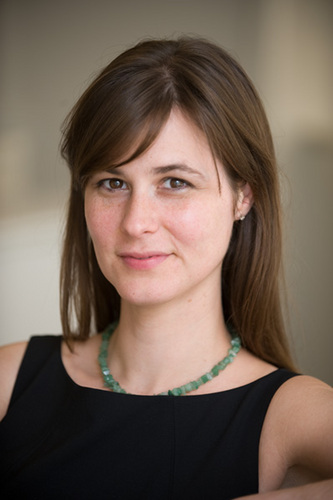
Coral Davenport
Coral Davenport, one of The New York Times’ few environmental reporters, is repeating her past mistakes on Keystone XL reporting. The Keystone XL pipeline would connect Canada’s tar sands to Texan oil refineries, allowing the high-carbon product to reach the global oil market. Over its forty-year intended lifetime, the pipeline’s tar sands crude would have a greenhouse-pollution footprint of about 7 billion tons of carbon dioxide, the equivalent of forty new coal-fired power plants. By any reasonable measure, the Keystone XL pipeline is a major piece of infrastructure for the Canadian tar-sands industry and a significant threat to a safe climate.
In a recent story entitled “Experts Say That Battle on Keystone Pipeline Is Over Politics, Not Facts,” Davenport claimed that the tar-sands pipeline has little real policy significance.But most energy and policy experts say the battle over Keystone overshadows the importance of the project as an environmental threat or an engine of the economy. The pipeline will have little effect, they say, on climate change, production of the Canadian oil sands, gasoline prices and the overall job market in the United States.
On Earth Day last year, Davenport penned a nearly identical story, writing, “when it comes to the pipeline’s true impact on global warming, energy and climate change experts — including former Obama administration officials — say Keystone’s political symbolism vastly outweighs its policy substance.”
The original version of last year’s story understated the scale of the tar-sands pipeline’s greenhouse pollution by a factor of ten.
Davenport’s new story relies on experts who have done work on behalf of the oil and gas industry, leading with Robert Stavins, the influential Harvard Kennedy School economist who has studied climate policy for the last thirty years. Stavins claims:“The political fight about Keystone is vastly greater than the economic, environmental or energy impact of the pipeline itself. It doesn’t make a big difference in energy prices, employment, or climate change either way.”
An active supporter of the boom in natural gas extraction, Stavins also opposes the climate movement’s campaign to divest universities and other institutions from the fossil fuel industry.
It does not appear that Stavins has conducted any published work on Keystone XL or the economics of Canadian tar sands. However, a Kennedy School doctoral candidate named Gabe Chan has analyzed the climate economics of Canada’s tar sands. Chan and his co-authors found that under global policy that maintains a safe climate, Canada’s tar-sands development would collapse. The study raises serious questions about whether approval of Keystone XL is consistent with the international climate commitments the State Department has made at the direction of President Barack Obama.
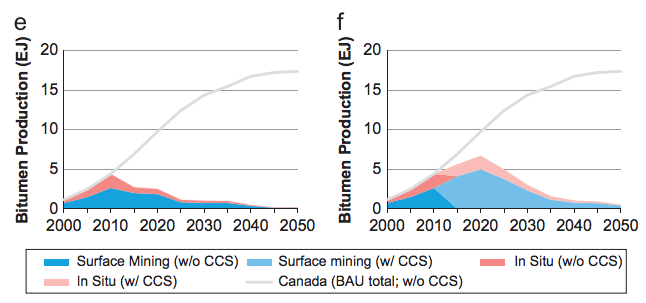
With climate policies implemented worldwide, the Canadian bitumen production is significantly reduced. Left (e) shows global climate policy scenario, right (f) global climate policy with carbon-capture-and-sequestration technology. (Chan et al. 2012)
The other people denoted as “experts” by Davenport are Robert McNally, a former George W. Bush official who now works as an professional advocate for the oil and natural gas industry, and Christine Tezak, a pipeline-finance analyst, who bet that Keystone XL would be approved in 2011 (as did her current boss, Kevin Book).
Stavins has done consulting work for Chevron, Exelon, Duke Energy, and the Western States Petroleum Association. Neither McNally nor Tezak publicly disclose their clients who are part of or invest in the fossil-fuel industry. None have a scientific background, and none have published work analyzing the environmental impact of the Keystone XL pipeline.
In the words of climate scientist John Abraham, “People who think Keystone is a minor issue don’t understand science and they sure don’t understand economics.”
Graphs: U.S. and China Climate Commitments Leave No Room For World
The climate commitments announced by Presidents Barack Obama and Xi Jinping in China are momentous given the political status quo, but they still leave human civilization on a catastrophic trajectory, a Hill Heat analysis shows.
The non-binding targets agreed to in Beijing — that China would peak in emissions by 2030 and the U.S. would accelerate emissions cuts to reach 80 percent of current pollution levels (74 percent of 2005 levels) by 2025 — are a positive step forward. Without such targets catastrophic warming is guaranteed.
President Obama reaffirmed that limiting global warming to less than 2°C (3.6°F) above pre-industrial levels is his goal, claiming the announced targets “means the United States is doing its part to contain warming to 2 degrees Celsius.”
What do the announcements actually mean in the context of what is needed?
Below, we explore the targets in the context of a “Russian roulette” 2C pathway, with pollution levels that scientists estimate lead to a one-in-five chance of exceeding 2C. (Ed.: Russian roulette odds are actually a bit better.)
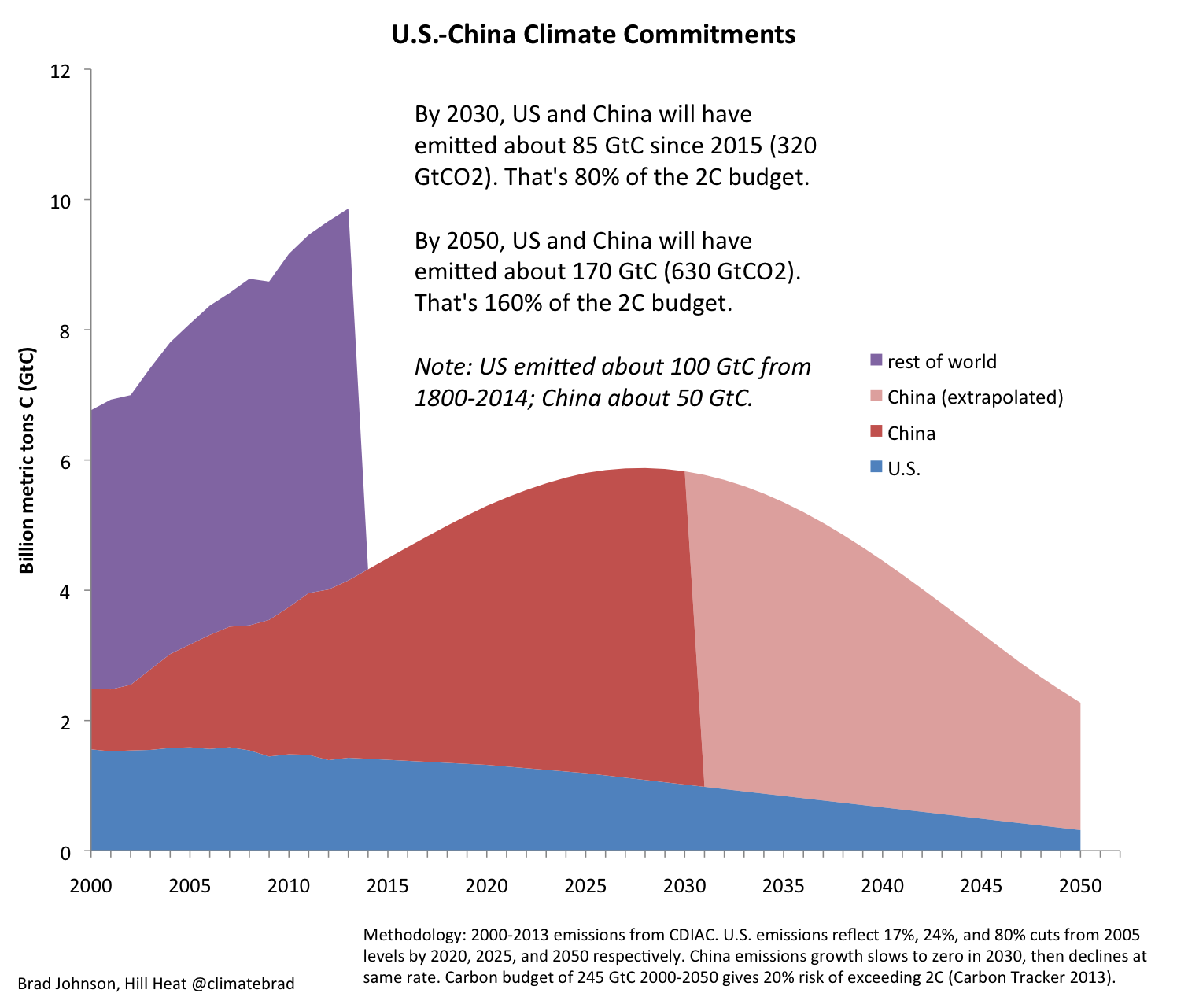
By 2030, US and China alone will have emitted about 80% of the carbon budget, leaving the other 75% of the global population with little to spare. By 2050, US and China will have emitted about 160% of the carbon budget, making the “Russian roulette” scenario impossible. To be clear, even 2C warming is highly risky, to say the least (Hansen et al, 2013).
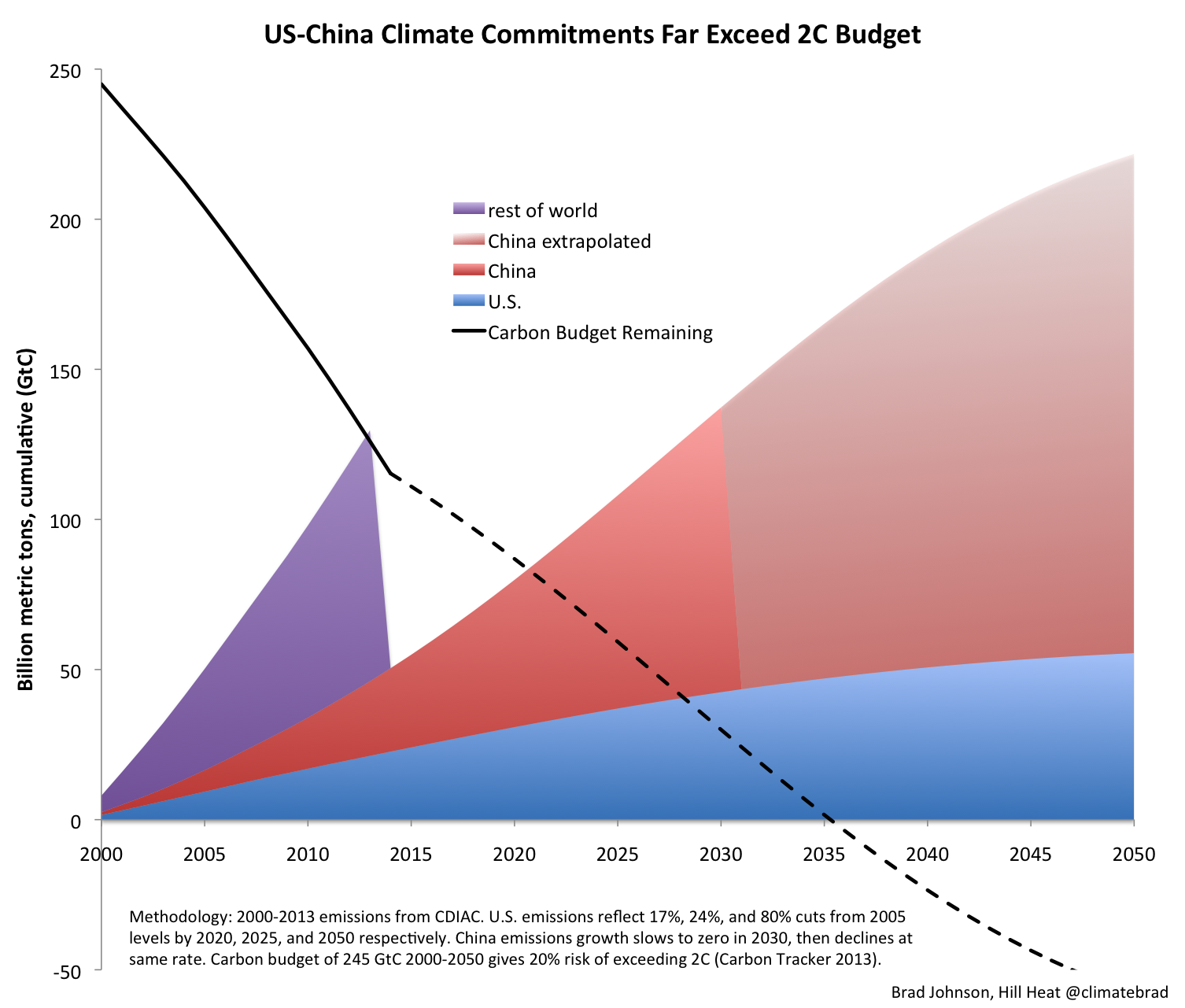
Graphing cumulative emissions, the U.S.-China trajectory becomes more readliy apparent, as the combined carbon footprint continues to grow rapidly through 2050. The carbon budget is used up by the two nations’ pollution alone by 2035.
The Trillionth Tonne Problem
How did we get to this point? About 420 gigatons of carbon were burned (1540 GtCO2) from the beginning of the Industrial Revolution to 2014, one quarter of which came from the United States, one eighth from China. Most of China’s carbon pollution has been emitted in the past 15 years. The 2015-2050 budget for an 80% chance of staying below 2C warming is only 105 GtC (390 GtCO2) more. Right now, human civilization is emitting about 10 GtC (39 GtCO2) a year—which means that even if global emissions growth slows, the carbon budget will be exceeded within about ten years.
This conundrum has been referred to as the “trillionth tonne” problem, which (somewhat confusingly) has been formulated in two different ways. One is that the 2000-2050 budget for a 75% chance of staying below 2C warming was estimated in Meinshausen et al. 2009 at 272 GtC, which equals 1000 GtCO2—that is, one trillion metric tons of carbon dioxide. (Ed.: The use of the British spelling “tonne” is a useful indicator of the 1000-kilogran metric “tonnes” used in the U.K., as opposed to the 2000-pound short tons used in the U.S., which are a bit smaller. Each metric ton of carbon is the equivalent of 3.67 metric tons of carbon dioxide due to the added oxygen atoms.)
Alternatively, the all-time budget (starting with the Industrial Revolution and going forward to 2500) for 2C being the mostly likely warming scenario, with a 95% interval of 1.3-3.9C warming, was estimated in Allen et al. 2009 at 1000 GtC — or one trillion metric tons of carbon. With about 560 GtC burned 1751-2014, that leaves 440 GtC for the rest of time for humanity to burn for less than even odds of staying below 2C.
These competing formulations of the “trillionth tonne” problem were co-published in the April 30th 2009 issue of Nature.
Both mechanisms of analysis — which are confirmed, updated, and bolstered in the IPCC’s Fifth Assessment Report (Working Group 1 Chapter 12) — are based on the warming impact of all climate pollution, which is predominated by carbon dioxide from burning fossil fuels and deforestation, but also includes methane, aerosols, nitrous oxides, and exotic super-greenhouse gases. Aerosols, which reduce warming by blocking out the sun, are on the decrease, while non-CO2 greenhouse gases are increasing. The calculations in this post are based on the assumption that the CO2 emissions calculated by the Carbon Dioxide Information Analysis Center can be used in lieu of the total CO2-equivalent emissions. That assumption is increasingly untenable, especially as nations switch from coal to natural gas, which increases methane emissions. Thus, the scenarios presented here-in should be considered optimistic.
The construction of any new fossil-fuel infrastructure, such as the Keystone XL pipeline, is simply incompatible with a pathway toward climate safety. This fact is implicitly acknowledged in the climate-impact analysis of the tar-sands project, which uses a high-emissions energy scenario as its baseline.
In summary: anyone who believes “we have a moral obligation to fight climate change,” to use President Obama’s words, should be working to phase out all of our existing fossil-fuel infrastructure over the coming ten years, with the goal of a carbon-negative global economy.
Even if the rest of the world follows the US and China lead with commitments to stop emissions growth by 2030, there will be a high risk of catastrophic global warming. Assuming the US and China meet their targets and the rest of the world follows suit, humanity will burn through the Russian-roulette chance at staying below 2C warming before 2025.
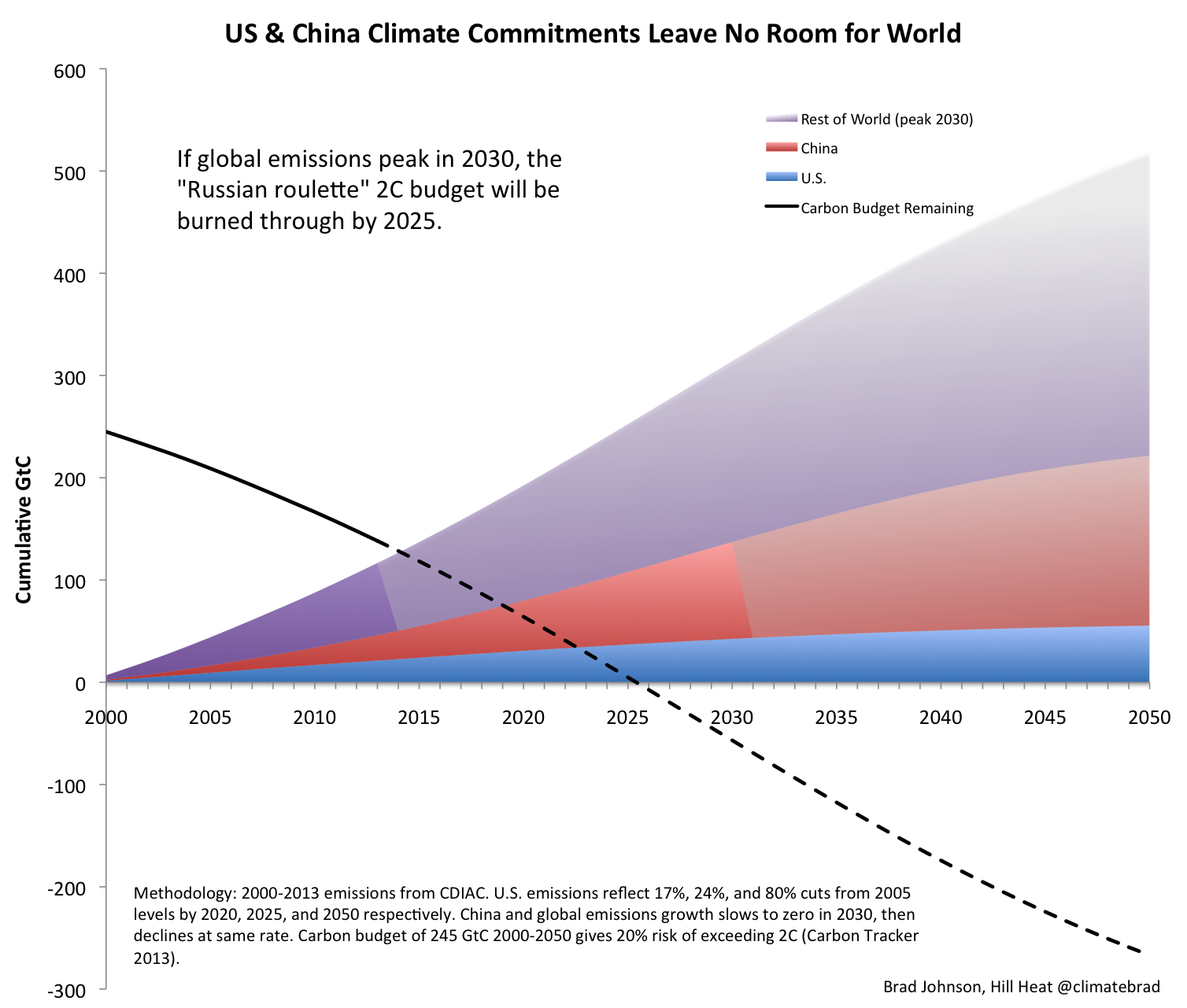
For small-island nations, coral reefs, global forests, Arctic ice, permafrost, and global ice sheets — and quite possibly the rest of human civilization — to have a long-term chance of survival, limiting warming to 1.5C looks to be needed. (This would require a rapid transition to a fossil-free economy with massive reforestation to reduce existing CO2 concentrations in the atmosphere to 350 parts per million or lower, the inspiration for the name of the climate organization 350.org.)
A higher tolerance for catastrophic warming — by raising the risk of 2C warming from 20 percent to 50 percent — gives the world a more leeway for pollution, but not enough to make the announced US-China targets “safe”. The global budget for a 50-50 chance of 2C warming will be exhausted before 2040.
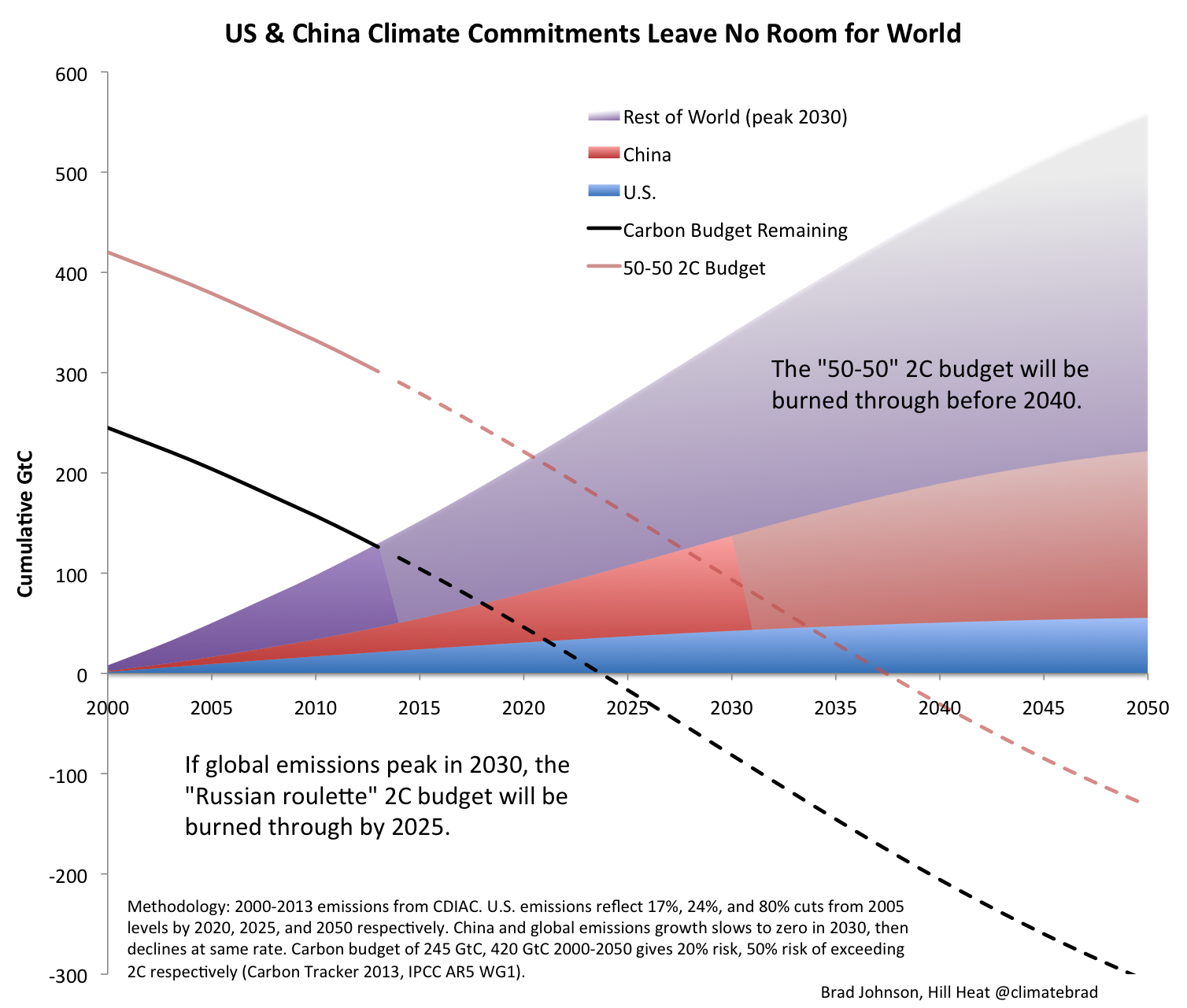
The insufficiency of these newly announced targets — and the howls of outrage heard from the Republican Party in the United States — reflect the dangerous power the global fossil-fuel industry has over our future, at a time when our species’ collective power should be directed at building a fossil-free civilization.
Sapping ALEC's Power: Software Giant SAP Dumps Group Over Climate Denial
 The tech exodus from the American Legislative Exchange Council continues, with German software giant SAP ending its membership in the anti-climate lobbying group. The blow is especially harsh as ALEC’s corporate board was chaired by SAP lobbyist Steve Seale. SAP’s departure comes in the wake of Google, Microsoft, Facebook, and other tech companies leaving in quick succession this fall.
The tech exodus from the American Legislative Exchange Council continues, with German software giant SAP ending its membership in the anti-climate lobbying group. The blow is especially harsh as ALEC’s corporate board was chaired by SAP lobbyist Steve Seale. SAP’s departure comes in the wake of Google, Microsoft, Facebook, and other tech companies leaving in quick succession this fall.
German business journal Manager Magazin reported the departure on Wednesday. “We have decided that we will leave the organization today,” an SAP spokeswoman told the magazine.
The spokeswoman told Manager that the company abandoned ALEC because of its “merkwürdigen” (strange) positions—such as its support for Stand Your Ground laws, climate denial, and opposition to solar energy deployment. Germany’s state-supported solar-power revolution (part of its “Energiewende” transition) is in stark contrast to the United States, in no small part because of the work ALEC has done for decades to oppose renewable energy.
SAP, which touts its sustainability leadership, is a major producer of smart-grid and energy-efficiency solutions. Unlike ALEC, SAP is unambiguous about the threat of fossil-fueled climate change, saying that “with the dangers and costs of global warming and rising carbon dioxide levels, and it’s clear that increased energy efficiency is an absolute must.”
At the UN Climate Summit in New York City this September, SAP signed on to the World Bank effort calling for a global price on carbon pollution.
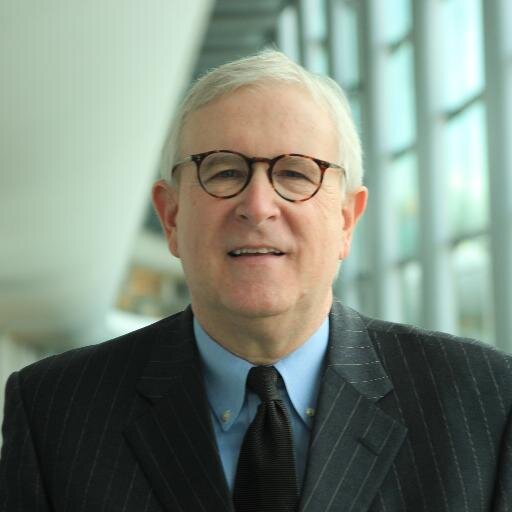
SAP lobbyist Steve Seale, former ALEC corporate board chair
SAP’s union representatives in Germany were quick to decry the corporation’s involvement in ALEC. “SAP has no place in a political organization that represents the positions of the Tea Party,” a representative told Sorge. His article also noted Google chair Eric Schmidt’s excoriation of ALEC as a group of “liars.”
“SAP America’s strong commitment to the American Legislative Exchange Council is due to the nonprofit’s significant impact and the opportunities it creates for the exchange of ideas,” Seale said upon his appointment to the ALEC board a year ago.
As of publication, Seale is still listed as the chair of the ALEC corporate board on the group’s website.
[UPDATE] “SAP has decided to immediately disassociate itself from ALEC,” a company representative said in a statement given to the Center for Media and Democracy. “The membership had been under review for some time and is now being canceled.”
When asked if the decision was because of ALEC’s climate denial, the representative replied, “Not only [that] position, on gun control and voter rights as well.”
“In the wake of the elections where a clear mandate for limited-government, state-based policies was offered by the American people,” an ALEC spokesperson told National Journal, “it is too bad that companies like SAP are making short-sighted decisions based on misinformation.”
Fracking Opponents Rack Up Victories in Local Battles
This Election Day, opponents of the hydrofracturing boom achieved a number of local ballot victories, overcoming massive spending by the fossil-fuel industry.
- Voters in Denton, Texas, the “birthplace” of the modern fracking boom, banned fracking in a landslide vote. Supporters of the ban were outspent by the oil-and-gas industry ten to one.
- Athens, Ohio voters “overwhelmingly” passed a ban on fracking. An astounding 78 percent of voters supported the ban.
- Central California’s San Benito County, which lies atop the Monterey Shale formation, passed Measure J to ban fracking, overcoming $1.8 million in spending from Chevron, ExxonMobil, Occidental Petroleum and other oil companies. Supporters of the ban won despite being outspent 15 to one.
- Northern California’s Mendocino County likewise passed Measure S to ban fracking, with 67 percent of the vote. The successful effort was led by the Community Rights Network of Mendocino County, a grassroots group of 30 activists supported by groups such as Californians Against Fracking, Community Environmental Legal Defense Fund, and Global Exchange.
There were additional local victories for oil-industry opponents and environmentalists across the nation.
In Richmond, the San Francisco suburb home to a major Chevron refinery which exploded in 1989, 1999, and 2012, a five-member progressive slate for mayor and city council won decisive victory over the Chevron-supported candidates. The progressives, supported by Richmond Working Families (ACCE Action, APEN Action, SEIU 1021), and by the Richmond Progressive Alliance, overcame $3 million in spending by the oil giant, a 60 to one spending ratio.
Fracking opponent Kristy Pagan, a first-time candidate, won election in Michigan’s state House 21st District.
In one of the few national races to swing unexpectedly for Democrats, Rep. Lee Terry of Nebraska, a major Keystone XL backer, lost to Democratic challenger Brad Ashford, who has also expressed support for the pipeline but was endorsed by the League of Conservation Voters.
In another local victory against industrial interests, a ban on genetically engineered crops in Maui County, Hawaii, narrowly passed, overcoming $8 million in spending from opponents such as Monsanto and Dow, who profit from the treatment of food as intellectual property. The failed opposition outspent advocates 87 to 1. GMO-labeling measures failed under a similar spending onslaught in Colorado and Oregon.
“Their wins aren’t wins just for their communities — they are wins for all of us pushing back against the fossil fuel industry and for a climate safe future,” Oil Change International’s David Turnbull wrote. “They are bright spots in an otherwise dim night.”
VIDEO: Cory Gardner: "We Have to Stand Up to the Radical Environmentalists"
Speaking at a right-wing conference, Rep. Cory Gardner (R-Colo.) denounced the “radical environmentalists” and “social engineers” who oppose the “individual job creators” who run fossil-fuel companies. Promising the Keystone XL pipeline will get built, Gardner went on to describe his allegiance to the fracking “shale revolution”: “We will rise up, and we will win!”
Rep. Cory Gardner (R-Colo.), now challenging Democrat Mark Udall’s U.S. Senate seat, has run a campaign as a “likeable” moderate.
Dick and Liz Cheney were the featured stars at the Steamboat Institute Freedom Conference, which took place in Steamboat Springs, Colo., on August 23, 2013. Gardner was the first speaker at the conference.
Gardner’s remarks about the “power” of fossil-fuel executives who “realize what is at stake in this country” alludes to the petrochemical billionaire Koch brothers and other campaign contributors.
Gardner is a “long-time friend” of Americans for Prosperity Colorado head Jeff Crank, and is known to have appeared at the Koch’s 2014 summit in California. AFP and the Koch super PAC Freedom Partners have spent over $3 million supporting Gardner’s candidacy, primarily by attacking Udall. Koch Industries is Gardner’s top campaign contributor this cycle. Gardner, who joined Congress in 2011, has raked in $772,000 in campaign contributions from the oil & gas industry.
TRANSCRIPT:
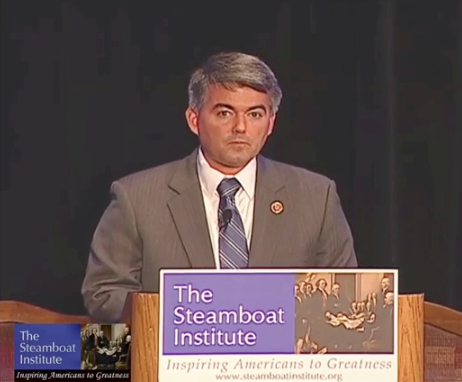
We have to stand up to the radical environmentalists, the social engineers who believe that we must stop. And in Colorado we know that threat is real. We know they’re going to try to stop something that is creating jobs on the eastern plains and the western slope of this great state. We know they’re going to try to say no to the Marcellus, no to the Bakken. They’ve already tried to say no to the Keystone pipeline. But you know what? We know we’re going to win because of the power of our individual job creators. They are right, they are with us. And when the individuals realize what is at stake in this country, we will rise up, and we will win. The shale revolution is real.
VIDEO: Iowa Senate Candidate Denies Coordinating With Kochs After Attending Koch Summit
U.S. Senate candidate Joni Ernst denied coordinating with outside groups who are involved in the race, despite her participation in a secret summit organized by the Koch brothers in June. Speaking at a Des Moines, Iowa, event on October 23, Ernst claimed she doesn’t have any contact with outside groups that are running negative ads.
“I can’t control the outside groups, with the independent expenditures,” Ernst said. “You know, I don’t have contact with them.”
However, at June Koch summit in Dana Point, Calif., Ernst thanked the Koch network, which is now spending millions of dollars in attack ads and get-out-the-vote efforts on her behalf, for discovering her and powering her candidacy.
“A little-known state senator from a very rural part of Iowa, known through my National Guard service and some circles in Iowa. But the exposure to this group and to this network and the opportunity to meet so many of you, that really started my trajectory,” Ernst was recorded saying. “We are going to paint some very clear differences in this general election,” she said. “And this is the thing that we are going to take back—that it started right here with all of your folks, this wonderful network.”
As of October 27, the Koch super PAC Freedom Partners Fund has spent over $3,158,815 for Ernst, and the Koch 501c4 Americans for Prosperity has spent $250,954, according to FEC records compiled by the Center for Responsive Politics.
Ernst’s remarks in Des Moines were recorded by the Young Turks Undercurrent’s Lauren Windsor, who said Ernst was caught in a “big fat Koch lie.” Windsor had earlier released the audio recording of Ernst and other GOP Senate candidates speaking at the Koch retreat.
(Windsor is not associated with The Undercurrent, a right-wing libertarian campus magazine that promotes the Koch network.)
UnKochMyCampus: New Grassroots Effort Launches to Fight Koch Influence on Higher Education
 Students across the country have launched a new effort to protest the influence of the petrochemical billionaire Koch brothers on their campuses. As part of their effort to influence the American political system, Charles and David Koch have flooded hundreds of universities with contributions intended to promote their economic agenda. Although the contributions go back for decades, the spigot has been opened wide in recent years; from only seven universities recorded to have Koch contributions in 2005 to over 250 by 2012. According to UnKochMyCampus, the new grassroots effort to oppose Koch influence on higher education, 390 different colleges and universities have received Koch money.
Students across the country have launched a new effort to protest the influence of the petrochemical billionaire Koch brothers on their campuses. As part of their effort to influence the American political system, Charles and David Koch have flooded hundreds of universities with contributions intended to promote their economic agenda. Although the contributions go back for decades, the spigot has been opened wide in recent years; from only seven universities recorded to have Koch contributions in 2005 to over 250 by 2012. According to UnKochMyCampus, the new grassroots effort to oppose Koch influence on higher education, 390 different colleges and universities have received Koch money.
The UnKochMyCampus effort was launched by three young activists: Kalin Jordan, a graduate of Suffolk University, where the Koch-funded Beacon Hill Institute is housed; Lindsey Berger, a Missouri State University graduate and campus organizer, and Connor Gibson, a University of Vermont graduate and Greenpeace researcher. Jordan founded the Koch Free Zone campaign at Suffolk in 2013 to end the Koch influence over the Beacon Hill Institute, one of a nationwide network of right-wing think tanks. The UnKochMyCampus site has a organizer’s guide to help students launch campaigns on their own campuses, including background research on the Koch brothers.
There are now at least four campuses that have active student efforts opposing Koch influence:
- Suffolk University in Boston, Mass.: KochFreeZone.org
- Florida State University, Tallahassee, Fla.: Progress Coalition
- University of Kansas, Lawrence, Kans.: Students for a Sustainable Future
- George Mason Unversity, Fairfax, Va.: Transparent GMU
All four universities have clear evidence of Koch influence over the educational system; George Mason houses the Mercatus Center, the Koch-powered deregulatory think tank. Florida State is the center of a scandal over a $1.5 million pledge from the Kochs that gave them control over hiring and curricula at the school. In 2001, the Kochs founded the University of Kansas Center for Applied Economics, modeled after the Mercatus Center, with a Koch lobbyist as its head.
There are also online efforts opposing Koch influence at the University of Arizona, Catholic University of America, and California State University at Northridge.
In September 2014, Gibson and Berger published an extended Greenpeace report entitled “Koch on Campus: Polluting Higher Education,” that detailed the $49.5 million known to have flown from Koch foundations to over 250 campuses, based on IRS filings.
This money is in addition to the $185 million David Koch has given directly to the Massachusetts Institute of Technology and $20 million to Johns Hopkins University, primarily for cancer research. Although those seem like substantial sums, those amounts are dwarfed by the billions of dollars in cuts in public funding for cancer research that have come as a result of Koch political advocacy.
In addition to the website, UnKoch My Campus has a Twitter account.
Rally for a Koch-free WGBH
One year ago, more than fifty Bostonians (and Elmo) presented the WGBH board with 50,000 signatures demanding the removal of David Koch as a trustee. One year later, despite an ever-louder chorus of voices demanding Koch’s removal, he remains on the board. So we’ll be returning this year, stronger than ever. We’ll rally outside the WGBH building and present the WGBH board with 400,000 signatures demanding Koch’s removal.
3:00pm – 4:00pm ET: Listen to music, speakers, hold signs and engage in fun chants.
4:00 pm: Attend the public portion of the WGBH board meeting with Koch-Free WGBH t-shirts (will be supplied by us, if you don’t have one already).
WGBH’s offices at One Guest Street, Boston (accessible by the 86 and 64 MBTA bus lines)